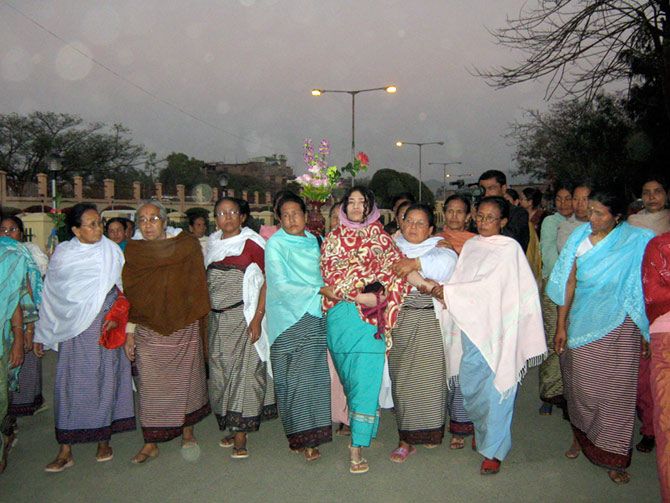'The government needs to think if a draconian, outdated and colonial law is needed in a democratic, multi religious, diverse country governed by a democratic government.'

"My demand for the removal of AFSPA for which I was on hunger strike for 16 years is almost near completion," says Irom Sharmila, the Manipuri activist who spent half her life defiantly protesting against the Armed Forces Special Powers Act, 1958.
The law is now applicable fully only in 31 districts and partially in 12 districts of four states in the North East -- Assam, Nagaland, Manipur and Arunachal Pradesh.
AFSPA has been in force in Manipur since the 1980s to control insurgency and gives sweeping powers to security forces to make arrests without a warrant. It also grants security personnel immunity from arrest.
"My wish is that it is withdrawn from the remaining parts of the country also," Irom Sharmila tells Rediff.com's Archana Masih in a phone interview from Bengaluru.
Known as the 'Iron Lady of Manipur', she ended her fast in 2016 and contested the 2017 Manipur election. She faced a bitter defeat and turned her back on politics.
Disillusioned by the expectations of her supporters, Sharmila left Manipur and has not returned since.
She got married in 2017 and has made Bengaluru her home where she lives with her twin daughters and husband.
In a conversation where children's voices can be heard in the background, she says the government sees Manipur as a region of conflict, but there are no real terrorists there.
The Manipur chief minister has acknowledged your 16-year hunger strike and said the state will invite and honour you. Have you received any communication from state officials?
Nothing so far.
If I am invited, it will give me an opportunity to raise the issue of the complete removal of the Armed Forces Special Powers from the soil of India because the act is still in force in other districts of Manipur and several other states.
This is the second phase of the withdrawal because the disturbed area status was removed from Imphal municipality in 2004.
I want to appeal to the Government of India that the money and labour that they invest in enforcing AFSPA should instead be used for developing roads, infrastructure, setting up factories, industries and creating jobs in those states.
Road transportation is poor in the hilly districts and there is a lack of facilities.
The youth try for government jobs and if they pass the entrance exams they join the army, or police and become instruments in enforcing AFSPA on their own people.
Being a border state, Manipur is seen as a buffer zone between neighbouring Myanmar and the rest of India. This is the main reason for enforcing AFSPA in the state. The government sees it as a region of conflict, but there are no real terrorists here.
Do you feel that your 16 year hunger strike for the removal of AFSPA has finally had some result?
The government's decision to reduce the number of areas under AFSPA is good and positive. I feel that my demand for the removal of AFSPA -- for which I had protested for half my life -- is almost near completion, but my wish is that it is removed from the remaining parts of the country also.
People living under AFSPA are suffering under an outdated law. There should be a connection with the hearts of the people rather than applying a colonial law on your own people.

Have the people who supported your hunger strike in Manipur connected with you after AFSPA was withdrawn from areas under 15 police station in Manipur?
No one apart from journalists has contacted me.
I have myself stayed away from Manipur and have no contact with anyone there.
Will you be happy to go back if the state invites and felicitates you? Will you take your family with you?
I won't be happy or sad. I think of Manipur as any other part of India.
Of course, I will take my family. My twins are just 3 years old. My husband is a heart patient.
Like I said, I would like to use the platform to raise my voice for the complete removal of AFSPA.
Otherwise, I would not like to go to Manipur. I have lived for 16 years in isolation in Manipur. I will return as soon as the function ends.
If you meet Manipur Chief Minister N Biren Singh, what will you tell him?
I will tell him that AFSPA has been used for over half a century, but it is not a solution. The Act should be brought to an end.
The state government should actively invest in development, education, employment generating skills and infrastructure.

How has life changed after you became a mother?
I am not any different from other mothers. A mother is a mother.
The problem was that the people of Manipur wanted to see me as their own version of me. When I started the sit in protest in 2000, hundreds of people would stand on the roads and look as if they were seeing a circus act.
People wanted a martyr for AFSPA, but God gave me a life.
My children go to pre-nursery and I am fully occupied in looking after them. I also do Zoom meetings and address students about causes that matter to me.
I have travelled for talks to Kerala, Tamil Nadu, Odisha, Delhi, Arunachal, Kashmir, Haryana and Maharashtra in the past.
You contested the last Manipur election five years ago. Will you try taking another shot at politics?
Though I fought the last state election, I am no longer in the field of politics.
I know life without politics is impossible, but once I left Manipur, I realised I do not want to indulge in any one particular field or focus on an issue pertaining to my home state alone.
I want to widen and expand my view and work for various issues concerning farmers, Dalits, orphans, and human rights in different parts of the country.
I would like to go to Kashmir and meet the victims of pellet gun injuries. Kashmir is so beautiful, but people have suffered a lot due to AFSPA.
Do you believe AFSPA will be withdrawn entirely in your lifetime?
Why not? The government has realised the futility of their efforts and the futility of wasting crores of rupees blindly. The government needs to think if a draconian, outdated and colonial law is needed in a democratic, multi religious, diverse country governed by a democratic government.

What do you think about the state of politics in India as a whole?
When candidates file their nominations, one can see their large assets and the criminal cases against many of them.
Criminals have entered politics. Politics has become dirty and corrupt. I saw all this closely during my own campaign five years ago.
Feature Presentation: Aslam Hunani/Rediff.com











 © 2025
© 2025